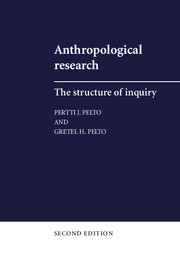Book contents
- Frontmatter
- Contents
- Preface to second edition
- Preface to first edition
- 1 The domain of methodology
- 2 Science and anthropology
- 3 Operationalism in anthropological research
- 4 Units of observation: emic and etic approaches
- 5 Tools of research – I
- 6 Tools of research – II: nonverbal techniques
- 7 Counting and sampling
- 8 Measurement, scales, and statistics
- 9 Art and science in field work
- 10 Research methods, relevance, and applied anthropology
- 11 Building anthropological theory: methods and models
- Appendixes
- Bibliography
- Index
8 - Measurement, scales, and statistics
Published online by Cambridge University Press: 05 June 2012
- Frontmatter
- Contents
- Preface to second edition
- Preface to first edition
- 1 The domain of methodology
- 2 Science and anthropology
- 3 Operationalism in anthropological research
- 4 Units of observation: emic and etic approaches
- 5 Tools of research – I
- 6 Tools of research – II: nonverbal techniques
- 7 Counting and sampling
- 8 Measurement, scales, and statistics
- 9 Art and science in field work
- 10 Research methods, relevance, and applied anthropology
- 11 Building anthropological theory: methods and models
- Appendixes
- Bibliography
- Index
Summary
Anthropological observations and probability inferences vary from the completely unsystematic quasi counting of some of the old-style ethnographic work to computerized multivariable data processing in many recent works. It is important for us to realize, however, that in most cases the underlying logic-in-use of the different studies is much the same, though they look very different in their presentations. As an example, let us briefly examine the logic of Benjamin Colby's computerized analysis of folktales, mentioned in Chapter 6. At first glance his analysis seems complex and strange because (1) the entire process was carried out by computer and (2) the patterns of data are illustrated in a manner that is different from usual renditions of folktale analysis. But we need only look for a moment at these materials to see the simplicity of the entire research plan. It can be conceptualized as follows:
(Idea) Perhaps folktales of different peoples can be distinguished in terms of variations in thematic patterning.
One way to analyze thematic pattems in folktales is to look at different uses (different frequencies, etc.) of particular words and clusters of words. (Hundreds of folktale analyses have depended on some variation of this essentially simple process.)
Counting the frequencies of a great number of different words in a collection of folktales is an incredibly time-consuming process; a computer (when properly programmed) can do the same task much more quickly and accurately. […]
- Type
- Chapter
- Information
- Anthropological ResearchThe Structure of Inquiry, pp. 141 - 176Publisher: Cambridge University PressPrint publication year: 1978



